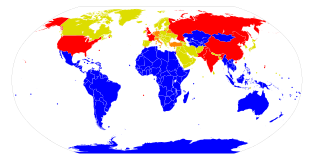
Nuclear disarmament is the act of reducing or eliminating nuclear weapons. Its end state can also be a nuclear-weapons-free world, in which nuclear weapons are completely eliminated. The term denuclearization is also used to describe the process leading to complete nuclear disarmament.

A weapon of mass destruction (WMD) is a biological, chemical, radiological, nuclear, or any other weapon that can kill or significantly harm many people or cause great damage to artificial structures, natural structures, or the biosphere. The scope and usage of the term has evolved and been disputed, often signifying more politically than technically. Originally coined in reference to aerial bombing with chemical explosives during World War II, it has later come to refer to large-scale weaponry of warfare-related technologies, such as biological, chemical, radiological, or nuclear warfare.

International Physicians for the Prevention of Nuclear War (IPPNW) is a non-partisan federation of national medical groups in 63 countries, representing doctors, medical students, other health workers, and concerned people who share the goal of creating a more peaceful and secure world free from the threat of nuclear annihilation. The organization's headquarters is in Malden, Massachusetts. IPPNW was awarded the Nobel Peace Prize in 1985.

The Pugwash Conferences on Science and World Affairs is an international organization that brings together scholars and public figures to work toward reducing the danger of armed conflict and to seek solutions to global security threats. It was founded in 1957 by Joseph Rotblat and Bertrand Russell in Pugwash, Nova Scotia, Canada, following the release of the Russell–Einstein Manifesto in 1955.
Janet Elizabeth Bloomfield was a British peace and disarmament campaigner who was chair of the Campaign for Nuclear Disarmament (CND) from 1993 to 1996.

Melissa Parke is a former Australian Labor Party politician and UN human rights lawyer, who served as Member for the federal electoral Division of Fremantle in the Australian House of Representatives from 2007 to 2016. In 2013 Parke was appointed by Prime Minister Kevin Rudd as Minister for International Development and served in that capacity until Labor lost government later that year.

The International Campaign to Abolish Nuclear Weapons is a global civil society coalition working to promote adherence to and full implementation of the Treaty on the Prohibition of Nuclear Weapons. The campaign helped bring about this treaty. ICAN was launched in 2007. In 2022, it counted 661 partner organizations in 110 countries.
Anti-nuclear organizations may oppose uranium mining, nuclear power, and/or nuclear weapons. Anti-nuclear groups have undertaken public protests and acts of civil disobedience which have included occupations of nuclear plant sites. Some of the most influential groups in the anti-nuclear movement have had members who were elite scientists, including several Nobel Laureates and many nuclear physicists.

A peace movement is a social movement which seeks to achieve ideals such as the ending of a particular war or minimizing inter-human violence in a particular place or situation. They are often linked to the goal of achieving world peace. Some of the methods used to achieve these goals include advocacy of pacifism, nonviolent resistance, diplomacy, boycotts, peace camps, ethical consumerism, supporting anti-war political candidates, supporting legislation to remove profits from government contracts to the military–industrial complex, banning guns, creating tools for open government and transparency, direct democracy, supporting whistleblowers who expose war crimes or conspiracies to create wars, demonstrations, and political lobbying. The political cooperative is an example of an organization which seeks to merge all peace-movement and green organizations; they may have diverse goals, but have the common ideal of peace and humane sustainability. A concern of some peace activists is the challenge of attaining peace when those against peace often use violence as their means of communication and empowerment.

The UN Office for Disarmament Affairs (UNODA) is an Office of the United Nations Secretariat established in January 1998 as the Department for Disarmament Affairs, part of United Nations Secretary-General Kofi Annan's plan to reform the UN as presented in his report to the General Assembly in July 1997.

Iran convened a conference titled "International Disarmament and Non-proliferation: World Security without Weapons of Mass Destruction" on 17 and 18 April 2010 in Tehran. The theme of the conference was Nuclear Energy for All, Nuclear Weapons for No One.

The Middle East nuclear weapon free zone (MENWFZ) is a proposed agreement similar to other nuclear-weapon-free zones. Steps towards the establishment of such a zone began in the 1960s led to a joint declaration by Egypt and Iran in 1974 which resulted in a General Assembly resolution. Following the 1995 NPT Review Conference, the International Atomic Energy Agency (IAEA) held a series of meetings involving experts and academics to consider ways to advance this process.
Paul Ingram is a former Senior Fellow of the British American Security Information Council (BASIC), a think tank focusing on nuclear disarmament based in London and Washington, D.C. He lives in London with his wife and two children.
The Japan Confederation of A- and H-Bomb Sufferers Organizations, often shortened to Nihon Hidankyō, is a group that represents survivors of the atomic bombings of Hiroshima and Nagasaki. It was formed in 1956.

The Treaty on the Prohibition of Nuclear Weapons (TPNW), or the Nuclear Weapon Ban Treaty, is the first legally binding international agreement to comprehensively prohibit nuclear weapons with the ultimate goal being their total elimination. It was adopted on 7 July 2017, opened for signature on 20 September 2017, and entered into force on 22 January 2021.

The 2017 Nobel Peace Prize was awarded to the International Campaign to Abolish Nuclear Weapons (ICAN) "for its work to draw attention to the catastrophic humanitarian consequences of any use of nuclear weapons and for its ground-breaking efforts to achieve a treaty-based prohibition on such weapons," according to the Norwegian Nobel Committee announcement on October 6, 2017. The award announcement acknowledged the fact that "the world's nine nuclear-armed powers and their allies" neither signed nor supported the treaty-based prohibition known as the Treaty on the Prohibition of Nuclear Weapons or nuclear ban treaty, yet in an interview Committee Chair Berit Reiss-Andersen told reporters that the award was intended to give "encouragement to all players in the field" to disarm. The award was hailed by civil society as well as governmental and intergovernmental representatives who support the nuclear ban treaty, but drew criticism from those opposed. At the Nobel Peace Prize award ceremony held in Oslo City Hall on December 10, 2017, Setsuko Thurlow, an 85-year-old woman who survived the 1945 atomic bombing of Hiroshima, and ICAN Executive Director Beatrice Fihn jointly received a medal and diploma of the award on behalf of ICAN and delivered the Nobel lecture.

Beatrice Fihn is a Swedish lawyer. She was the executive director of the International Campaign to Abolish Nuclear Weapons (ICAN) from 2014 to 1 February 2023.

Rebecca Johnson is a British peace activist and expert on nuclear disarmament. She is the director and founder of Acronym Institute for Disarmament Diplomacy as well as a co-founding strategist and organiser of the International Campaign to Abolish Nuclear Weapons.
The Middle East Treaty Organization (METO) is a non-governmental organization founded in 2017 by a coalition of civil-society activists and disarmament practitioners, with the aim to rid the Middle East of all weapons of mass destruction (WMD). This proposal is in line with the 1970s proposal for a Middle East nuclear weapon free zone, albeit with broader scope following the 1990 Mubarak Initiative to include chemical and biological as well as nuclear weapons.













